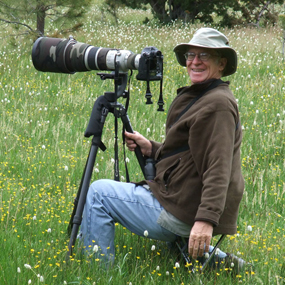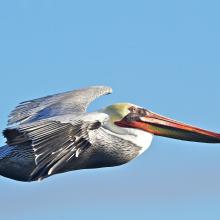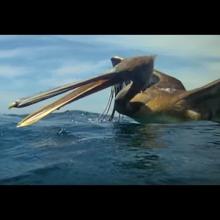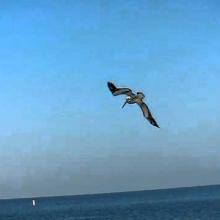

Join BirdNote tomorrow, November 30th!
Illustrator David Sibley and actor H. Jon Benjamin will face off in the bird illustration battle of the century during BirdNote's Year-end Celebration and Auction!
Brown Pelicans fly just above the surface of the water. They circle high, then diving headfirst, plunge under water to catch fish. But doesn't that hurt? Several adaptations protect pelicans as they dive. First, they have air sacs beneath the skin on their breasts, which act as cushions. Watch a slow-motion video of a pelican diving into the water, below.
Support for BirdNote comes from the Cornell Lab’s Bird Academy, with online courses for people of all knowledge levels. More at AllAboutBirds.org.
BirdNote®
How Brown Pelicans Dive
Written by Frances Wood
This is BirdNote!
[Sounds of waves and surf]
Imagine a line of Brown Pelicans flying just above the breaking surf of the coast.
Perhaps you’ve watched, and heard, these large, long-billed birds fishing. They circle high, then dive headfirst, plunging under water to catch fish.[More water and splash sounds]
But doesn’t that hurt? Anyone who has taken a belly flop off a diving board knows the powerful force of hitting the water.
Several adaptations protect Brown Pelicans as they dive, sometimes from as high as 60 feet. Air sacs beneath the skin on their breasts act like cushions. Also, while diving, a pelican rotates its body ever so slightly to the left. This rotation helps avoid injury to the esophagus and trachea, which are located on the right side of the bird’s neck. Pelicans have also learned that a steep dive angle, between 60 and 90 degrees, reduces aiming errors caused by water surface refraction. We know that pelicans “learn” this behavior because adults are better marksmen than young birds. [Splash]
Upon impact, the Brown Pelican opens its bill and expands its pouch, trapping small fish inside. Then the bird pops to the surface, spills out the water, and gulps down dinner [Splash]
For BirdNote, I’m Mary McCann. [Splash]
Have you seen our redesigned website yet? Check out the all-new birdnote.org today.
Support for BirdNote comes from the Cornell Lab’s Bird Academy, with online courses for people of all knowledge levels. More at All About Birds dot org.
###
Bird sounds provided by The Macaulay Library at the Cornell Lab of Ornithology, Ithaca, New York. Recorded by W.W.H. Gunn.
Producer: John Kessler
Executive Producer: Chris Peterson
© 2015 Tune In to Nature.org March 2018 / 2021 Narrator: Mary McCann
ID#032806BRPEKPLU BRPE-01b









